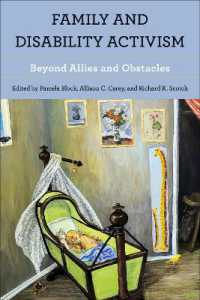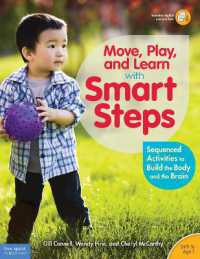- ホーム
- > 洋書
- > 英文書
- > History / World
Full Description
The Routledge Handbook of Classics and Cognitive Theory is an interdisciplinary volume that examines the application of cognitive theory to the study of the classical world, across several interrelated areas including linguistics, literary theory, social practices, performance, artificial intelligence and archaeology. With contributions from a diverse group of international scholars working in this exciting new area, the volume explores the processes of the mind drawing from research in psychology, philosophy, neuroscience, and anthropology, and interrogates the implications of these new approaches for the study of the ancient world.
Topics covered in this wide-ranging collection include: cognitive linguistics applied to Homeric and early Greek texts, Roman cultural semantics, linguistic embodiment in Latin literature, group identities in Greek lyric, cognitive dissonance in historiography, kinesthetic empathy in Sappho, artificial intelligence in Hesiod and Greek drama, the enactivism of Roman statues and memory and art in the Roman Empire.
This ground-breaking work is the first to organize the field, allowing both scholars and students access to the methodologies, bibliographies and techniques of the cognitive sciences and how they have been applied to classics.
Contents
Acknowledgements; Foreword, David Konstan; List of Contributors; Introduction, Peter Meineck, William Michael Short & Jennifer J. Devereaux; Part One: Cognitive Linguistics; 1. Cognitive-Functional Grammar and the Complexity of Early Greek Epic Diction, Ahuvia Kahane; 2. The Cognitive Linguistics of Homeric Surprise, Alexander S. W. Forte; 3. Construal and Immersion, a Cognitive Linguistic Approach to Homeric Immersivity, Rutger J. Allen; 4. Roman Cultural Semantics, William Michael Short; 5. Psycholinguistics and the Classical Languages, Alessandro Vatri; Part Two: Cognitive Literary Theory; 6. The Cognition of Deception: Falsehoods in Homer's Odyssey and their Audiences, Elizabeth Minchin; 7. The Forbidden Fruit of Compression in Homer, Anna Bonifazi; 8. Human Cognition and Narrative Closure: The Odyssey's Open-End, Joel Christensen; 9. "I'll imitate Helen"! Troubling Text-worlds and Schemas in Aristophanes' Thesmophoriazusae, Antonis Tsakmakis; 10. The Body-as-Metaphor in Latin Literature, Jennifer J. Devereaux; Part Three: Social Cognition; 11. Group Identity and Archaic Lyric: We-Group and Out-Group in Alcaeus 129, Jessica Romney; 12. Plato's Dialogically Extended Cognition: Cognitive Transformation as Elenctic Catharsis, Laura Candiotto; 13. Cognitive Dissonance, Defeat, and the Divinization of Demetrius Poliorcetes in Early Hellenistic Athens, Thomas R. Martin; 14. Irony in Theory and Practice. The Test Case of Cicero's Philippics, Luca Grillo; 15. Roman Ritual Orthopraxy and Overimitation, Jacob L. Mackey; 16. Theory of Mind from Athens to Augustine: Divine Omniscience and the Fear of God, Paul C. Dilley; Part Four: Performance and Cognition; 17. Sappho's Kinesthetic Turn: Agency and Embodiment in Archaic Greek Poetry, Sarah Olsen; 18. What Do We Actually See On Stage? A Cognitive Approach to the Interactions Between Visual and Aural Effects in the Performance of Greek Tragedy, Anne-Sophie Noel; 19. Mirth and Creative Cognition in the Spectating of Aristophanic Comedy, Angeliki Varakis-Martin; Part Five: Artificial Intelligence; 20. The Extended Mind of Hephaestus: Automata and Artificial Intelligence in Early Greek Hexameter, Amy Lather; 21. Staging Artificial Intelligence: The Case of Greek Drama, Maria Gerolemou; Part Six: Cognitive Archaeology; 22. Thinking with Statues: The Roman Public Portrait and the Cognition of Commemoration, Diana Y. Ng; 23. Animal Sacrifices in Roman Asia Minor and its Depictions: A Cognitive Approach, Günter Schörner; 24. Art, Architecture, and False Memory in the Roman Empire: A Cognitive Perspective, Maggie L. Popkin; Index







